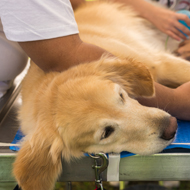Can vitamin D improve dog health?

The team will look at the potential benefits of vitamin D in helping animals to recover from surgery.
Edinburgh scientists are hoping to find out more about how pet dogs acquire vitamin D and how it affects their health and wellbeing.
In the first of a series of studies, the team from Edinburgh University's Royal (Dick) School of Veterinary Studies will look at the potential benefits of vitamin D in helping animals to recover from surgery.
Past research has found signs of increased inflammation often occur in animals with lower levels of vitamin D in their blood. The team hope to find out if this can hinder dogs' recovery after surgery.
Vets will assess pet dogs that have had surgery to repair damage to their knee ligaments. All of the dogs were injured spontaneously, mostly during walks with their owners. Blood samples will be taken before and after surgery to measure vitamin D levels and the team will look for any signs of inflammation. The dogs will then be monitored to see whether high levels of vitamin D before surgery could have a positive impact on their recovery.
A separate study will aim to find out how dogs acquire vitamin D and whether they can produce it in their skin the way humans do after exposure to the sun. It is widely believed that dogs acquire most of their vitamin D from their diet.
Scientists plan to take blood samples from the dogs to find out if vitamin D levels fluctuate with the changing seasons. The findings should help to determine whether dogs are getting enough vitamin D in their diet throughout the year.
Dr Richard Mellanby, head of veterinary clinical research and companion animal sciences at the Royal Dick vet school, said: "Vitamin D plays a vital role in bone health and there is growing evidence that it has other health benefits for people and animals. Our research aims to understand whether dogs’ vitamin D levels fluctuate throughout the year, which is important for making sure we’re feeding our pets the right diet.
"We’re also interested in how vitamin D affects recovery after surgery and whether having less vitamin D is a cause or consequence of inflammation. Untangling this complex relationship will help us to devise new approaches to improve the welfare of animals after surgery."



 The Veterinary Medicines Directorate (VMD) is inviting applications from veterinary students to attend a one-week extramural studies (EMS) placement in July 2026.
The Veterinary Medicines Directorate (VMD) is inviting applications from veterinary students to attend a one-week extramural studies (EMS) placement in July 2026.